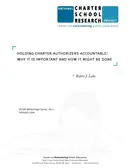Too many charter school authorizers aren’t fulfilling their responsibilities in providing adequate oversight for charter schools. This white paper examines the causes and consequences of poor authorizing and proposes how the problem might be fixed.
This paper defines a range of approaches and consequences states could pursue to improve authorizer accountability. Because most of these approaches have not been tried it is an open question whether the risks of any one approach is worth the potential gain.
The charter school movement is best known for redefining school-level regulation. In the end, however, it may be that the charter schooling’s most significant contribution to public policy is to finally draw the state into the question of how much and what kind of local oversight is required to maximize the effectiveness of public schools, and to serve as a forerunner/prototype for NCLB-era results-based school accountability in general.




